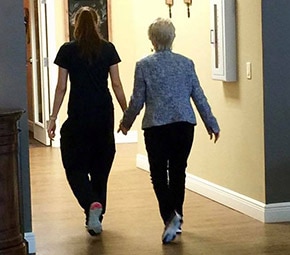During this time of year we tend to think more about who and what we are thankful for and personally that leads me to thinking about my purpose in life. We all need our own purpose as without it we do not feel wanted, appreciated, valued, loved or cared for and this can be the case even more so as we age. I have witnessed first hand more times than I can count how elders fear having no purpose which usually stems from isolation in the home.
Having a purpose feeds your self-worth and creates a life that makes you excited to get out of bed in the morning. I am beyond thankful that I have found my purpose many years ago which is trying to enrich the lives of every senior I meet, and also for being a part of the Angels Senior Living family because I have found people with the same mindset as myself. People who have a passion for going above and beyond to make every senior they meet live the utmost healthy and purpose filled life that they possibly can each and every day!
Angels Senior Living communities are filled with some of the most intriguing and fascinating men and women you will meet and our purpose is and always will be to promote a sense of purpose for them. Each and every person who joins our family will without a doubt feel wanted, appreciated, valued, loved, and cared for.
Upon entering one of our communities you will feel the love and see acts of kindness and caring-from the owner who celebrates Thanksgiving with his immediate family two days late every year because he is cooking Thanksgiving dinner for the residents to the receptionist who gives all residents a daily morning hug and the maintenance manager who comes in on his only day off to hang a residents’ favorite picture the day it is delivered. Imagine the surprise and excitement on resident’s faces when they wake to the sight of multiple decorated Christmas trees with presents underneath for all of them from a resident care aide and the nurse who brings her dog in often just to see the love and happiness on the resident’s faces. These are just a few small acts of love that you will encounter in our communities on a daily basis.
Besides the employees who are fortunate to be a part of the Angels Senior Living family the resident’s also build such beautiful and loving relationships with each other. These friendships are so special at this time in their lives and through them spending time together going on outings, seeing live shows, cooking and dining together and sharing secrets they give each other a sense of purpose and know that they are wanted, appreciated, valued, loved and cared for at all times.
Many of us have our own loved ones in an Angels Senior Living community as we know there is no better place for them to be! We invite you and your loved ones to join our family as our hearts are always overflowing with more than enough love for all as we strive to promote a sense of purpose.
Authored by:
Tracey Domzalski
Customer Service Manager, Assisted Living Division






